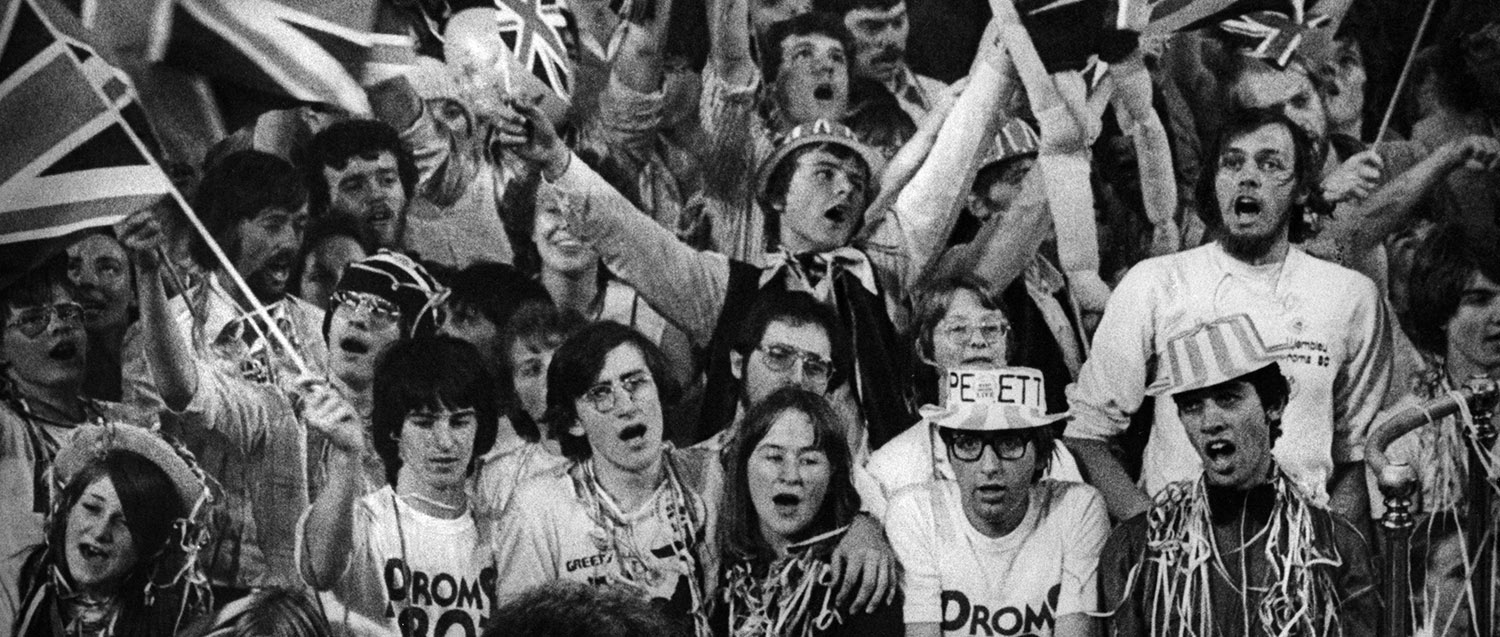
Music for the Masses: The Proms, Past and Present
Described by the Czech conductor Jiří Bělohlávek as “the world’s largest and most democratic musical festival”, the Proms is a yearly eight-week treat for music lovers in the UK and around the world.
Starting in July, concerts and other music events take place throughout the summer months, organised and broadcast by the BBC. Since the first festival was organised in 1895 it has grown to become a significant event in the British cultural calendar.
Prom is short for promenade concert, a term which originally referred to outdoor concerts in London’s pleasure gardens, where the audience was free to stroll around while the orchestra was playing. In the context of the BBC Proms, promming refers to the use of the standing areas inside the hall (the Arena and Gallery) for which ticket prices are much lower than for the seating. Proms concert-goers, particularly those who stand, are sometimes referred to as “Prommers” or “Promenaders”.
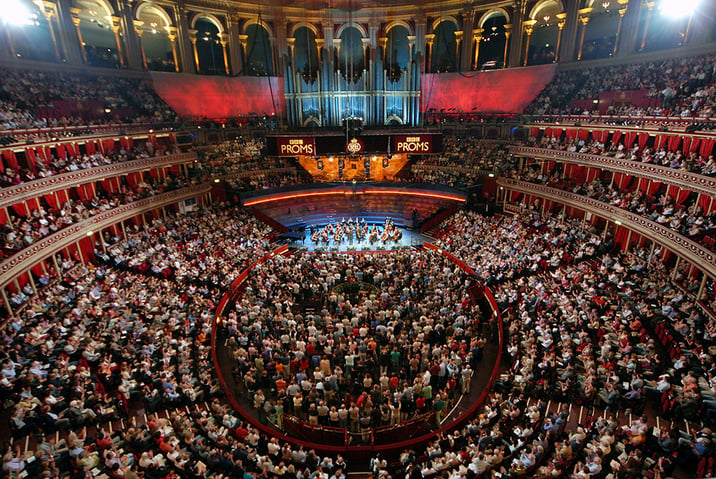
Royal Albert Hall Proms – audience applaud Simon Rattle and the Berliner Philharmoniker. BBC Proms 2006, Prom 65, September 2006. SR: Photo © Chris Christodoulou
The two key names behind the creation of the Proms are Robert Newman, the businessman and music impresario, and Sir Henry Wood, the conductor. Inspired by the increasingly popular outdoor promenade concerts mentioned above, Newman wished to create a wider audience for classical music concerts by offering low ticket prices and an informal atmosphere, where eating, drinking and smoking were permitted to the audience. He described his aim as follows:
“I am going to run nightly concerts and train the public by easy stages. Popular at first, gradually raising the standard until I have created a public for classical and modern music.“
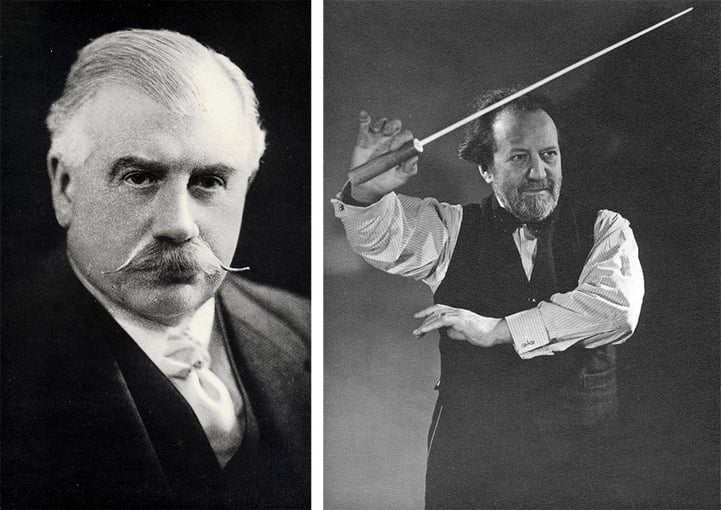
Left: Robert Newman portrait He / Lebrecht Music Arts. Right: Henry Wood / Royal Academy of Music, London, UK
Robert Newman secured funding for his plan on the condition that Sir Henry Wood was employed as the sole conductor. Wood, then aged only 26, seized the opportunity and created the Queen’s Hall Orchestra as the ensemble specially devoted to performing the promenade concerts. Newman went bankrupt in 1902, and although he did remain involved in the music planning for the Proms, it was Wood’s name that became most closely associated with the festival.
The first concert took place on the 10th August 1895 in Queen’s Hall in Langham Place.
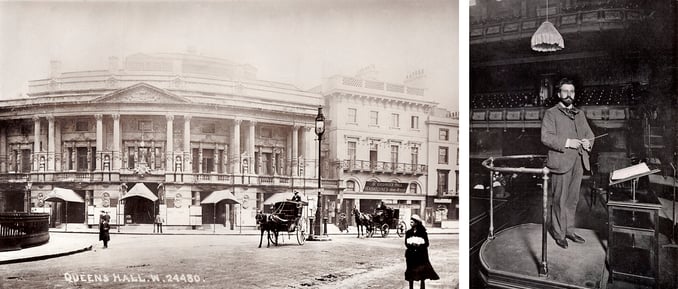
Left: Sir Henry Wood on the conductor’s podium at the Queen’s Hall, London, in 1903. Right: Queens Hall-exterior in Langham Place. St George’s Hall nearby. Early 1900 ‘s. c.1905
The BBC took over the running of the Proms in 1927 following the death of Robert Newman, and Sir Henry Wood Queen’s Hall Orchestra became BBC Symphony Orchestra (BBC SO), which remains to this day the permanent salaried orchestra for the BBC and the Proms. The Proms permanently moved to its current location, the Royal Albert Hall, after World War II in 1947.
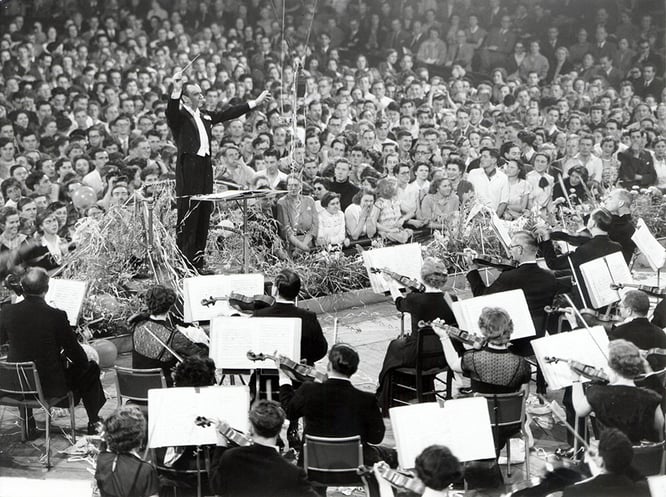
Last Night of the Proms with Sir Malcolm Sargent conducting at Royal Albert Hall, London, 1954 / Lebrecht Music Arts
Music at the Proms
Since post World War II, the Proms has included both new pieces by contemporary artists, as well as celebrating the work of composers who have significant anniversaries. The line up has now become truly international, as well as incorporating different genres of music, such as folk, electronic, and more ‘pop’ music as well as Classical.
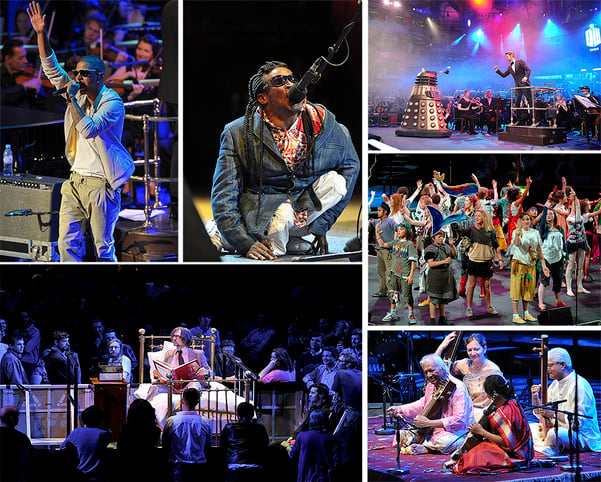
From top left clockwise: BBC Proms 2013. Prom 37 (photo); Prom 74 2012: Staff Benda Bilili (photo); BBC Proms 2013. Prom 3. (photo); The Diviners Tale Rachel (photo) / Photo © Chris Christodoulou; Pandit Ram Narayan, sarangi singer (photo) / Photo © Chris Christodoulou;BBC Proms 2013. Prom 37 (photo); The Diviners Tale Rachel (photo); Jarvis Cocker (photo).
People’s perception of the Proms usually derives from the Last Night, which traditionally takes place on the second Saturday of September. The music line up is usually much lighter in nature to the other Proms concerts, consisting of popular classics, followed by British patriotic pieces in the second half. This part traditionally includes Edward Elgar’s Pomp & Circumstance March No. 1 (to part of which “Land of Hope and Glory” is sung) and Henry Wood’s Fantasia on British Sea Songs, followed by Rule, Britannia!. The concert concludes with Hubert Parry’s Jerusalem, and the British national anthem. The flag waving, fancy dress and exuberant display of Britishness that characterises the Proms for many people take place on the Last Night.
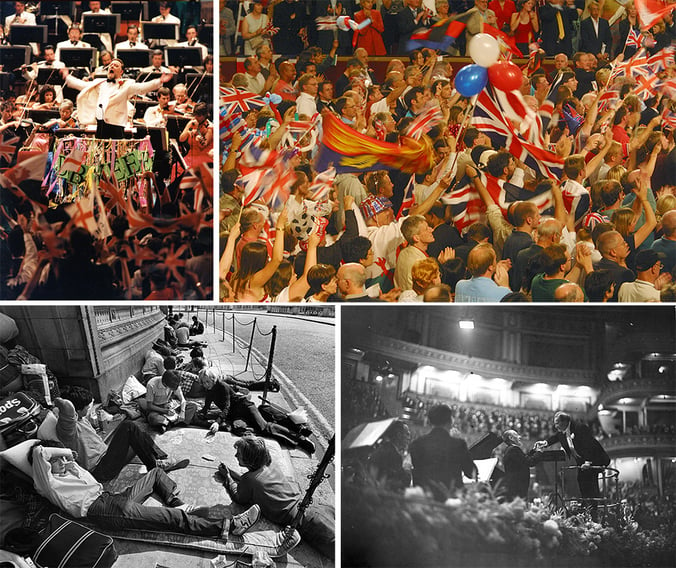
Top left: Last Night of the / Photo © Jim Four. Top right: Last Night of the / Photo © Toby Wales. Bottom left: Queue for Last night of 1981 Proms / Photo © Godfrey MacDomnic. Bottom right: Sir Henry Wood shaking hands from the podium with Sergei Rachmaninov, Royal Albert Hall, 1938 / Royal Academy of Music, London, UK
Find out more
Proms images from photographers and collections:
Godrey MacDomnic
Chris Christodoulou
Lebrecht Music & Arts
Royal Academy of Music
